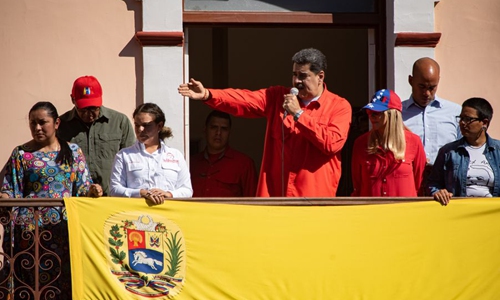Venezuela’s new oil minister named in US drug indictment
By AFP-Reuters Source:AFP - Reuters Published: 2020/4/28 19:33:40
Venezuelan President Nicolas Maduro on Monday named a top official targeted by US sanctions as oil minister as the market for the country's vital export is in tumult.

Maduro also named Asdrubal Chavez, cousin of the late president Hugo Chavez, as interim president of the state oil firm PDVSA.
El Aissami replaces Manuel Quevedo, a general given the twin responsibilities of oil minister and PDVSA chief in 2017.
The United States in 2017 designated El Aissami as having played "a significant role in international narcotics trafficking" and placed him on a most-wanted fugitives list in August 2019.
El Aissami declared his innocence and denounced the move as "a dirty trick."
The United States has been seeking for more than a year to oust Maduro. Along with some 60 other countries Washington recognizes opposition leader Juan Guaido as interim president. Secretary of State Mike Pompeo renewed support for Guaido in a telephone call Monday, the US State Department said.
The price of Venezuelan oil fell to below $10 a barrel last Friday - its lowest level in more than two decades.
Venezuela is almost entirely dependent on its oil revenues, which account for around 96 percent of its income. But oil prices have been sliding since 2014, exacerbating the country's ongoing economic crisis that has pushed almost five million Venezuelans to leave the country, according to UN figures.
Maduro's government blames US sanctions, including sanctions on PDVSA, for the crisis.
The United States has tried either to persuade nations, including Russia and India, from buying Venezuelan oil.
Although the South American country has the world's largest oil reserves, the country's oil sector suffers from corruption and lack of investment in upgrades and maintenance, according to analysts and the Venezuelan opposition.
The OPEC alliance of oil producers said "several" member states, and some of its allies in the OPEC+ grouping, held an "informal teleconference to brainstorm the current dramatic oil market situation" on April 22.
A photo tweeted by the organization appeared to show representatives from countries including Nigeria, Iraq and Venezuela taking part.
Venezuela's government is seeking to repair refineries, and it received refining materials via plane shipment from Iran.

Venezuelan President Nicolas Maduro speaks during the Anti-Imperialist March in Caracas, Venezuela, on January 23. Photo: Xinhua
Maduro tasked Tareck El Aissami, a vice president for the economy, with "restructuring and reorganization" of the OPEC member's crippled oil industry.Maduro also named Asdrubal Chavez, cousin of the late president Hugo Chavez, as interim president of the state oil firm PDVSA.
El Aissami replaces Manuel Quevedo, a general given the twin responsibilities of oil minister and PDVSA chief in 2017.
The United States in 2017 designated El Aissami as having played "a significant role in international narcotics trafficking" and placed him on a most-wanted fugitives list in August 2019.
El Aissami declared his innocence and denounced the move as "a dirty trick."
The United States has been seeking for more than a year to oust Maduro. Along with some 60 other countries Washington recognizes opposition leader Juan Guaido as interim president. Secretary of State Mike Pompeo renewed support for Guaido in a telephone call Monday, the US State Department said.
The price of Venezuelan oil fell to below $10 a barrel last Friday - its lowest level in more than two decades.
Venezuela is almost entirely dependent on its oil revenues, which account for around 96 percent of its income. But oil prices have been sliding since 2014, exacerbating the country's ongoing economic crisis that has pushed almost five million Venezuelans to leave the country, according to UN figures.
Maduro's government blames US sanctions, including sanctions on PDVSA, for the crisis.
The United States has tried either to persuade nations, including Russia and India, from buying Venezuelan oil.
Although the South American country has the world's largest oil reserves, the country's oil sector suffers from corruption and lack of investment in upgrades and maintenance, according to analysts and the Venezuelan opposition.
The OPEC alliance of oil producers said "several" member states, and some of its allies in the OPEC+ grouping, held an "informal teleconference to brainstorm the current dramatic oil market situation" on April 22.
A photo tweeted by the organization appeared to show representatives from countries including Nigeria, Iraq and Venezuela taking part.
Venezuela's government is seeking to repair refineries, and it received refining materials via plane shipment from Iran.
Posted in: AMERICAS,WORLD FOCUS